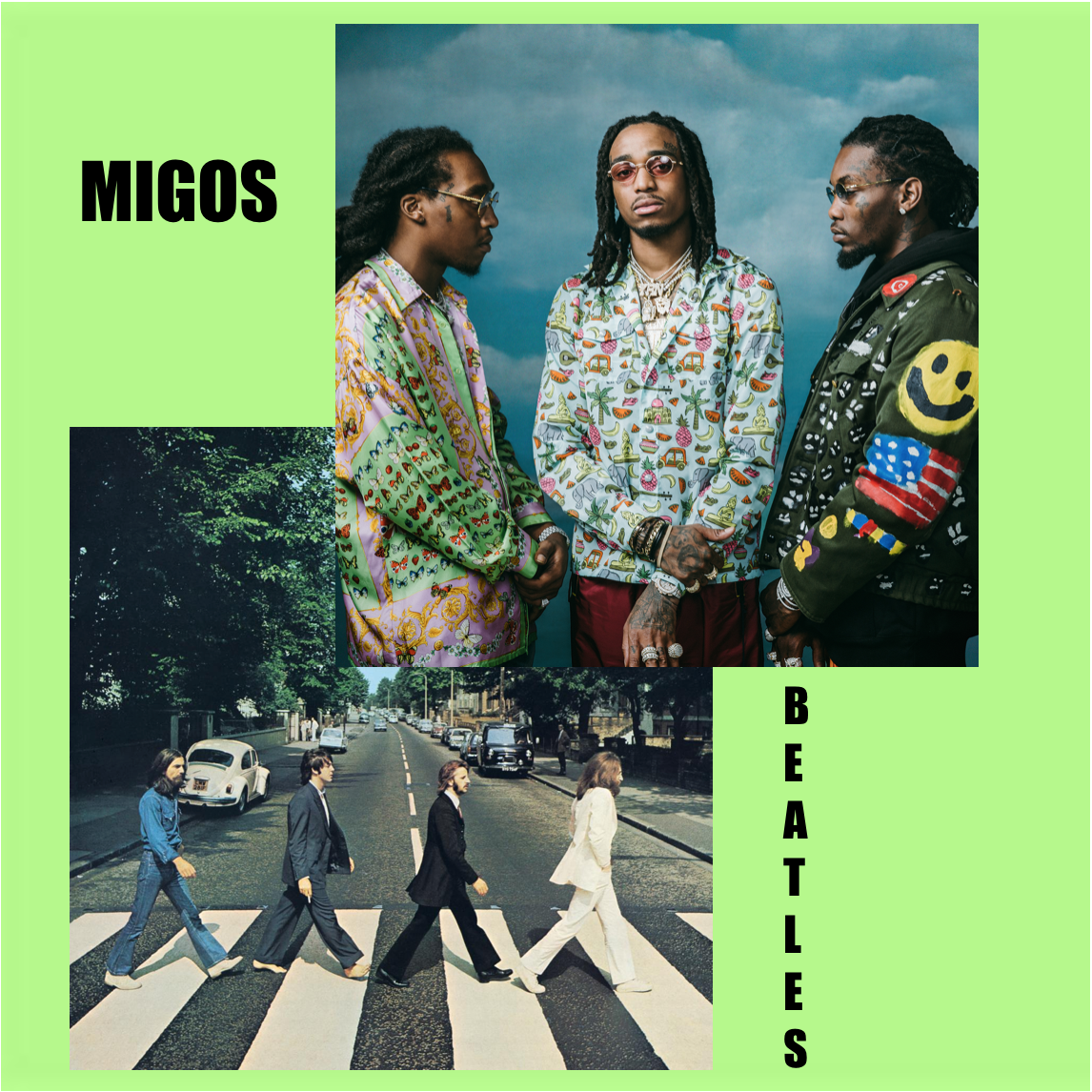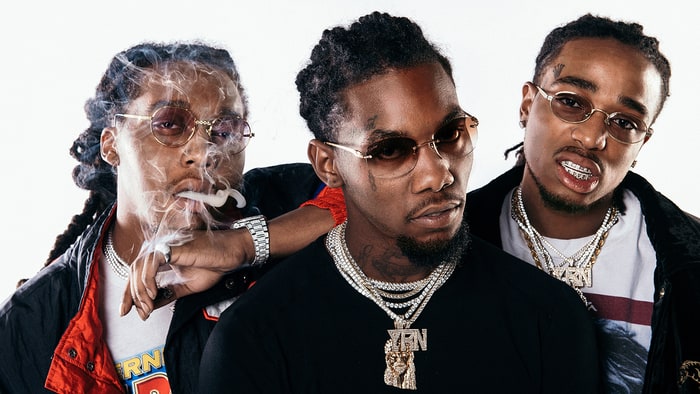
It was raining outside, but we didn’t let that deter our planned day drinking. Cheap champagne bubbled over OJ, half of a ping pong table facilitated beer games, and weed smoke circled the recessed lighting like a group of adolescents watching a fight in the school parking lot. As we gathered on the couch to watch the Raptors fend off the Bucks, me and my friends realized that Marv Albert’s iconic voice wasn’t the ideal background music. A few guys from Georgia quickly changed that.
“Seventeen five, same color T-shirt,” boomed out of the speakers, rippling the dispersed cups of mimosas like Jurassic Park, and causing a collection of tri-state Jews to culturally appropriate. After Quavo’s last time telling us that “momma told you” faded, there was a polarizing energy crowding the room. Half of us wanted the Migos to continue sponsoring our party, while half were pleading for musical diversification. “But bro, it’s Migos,” I thought to myself.
In our lubricated state, my friend and I adamantly said to one Migos naysayer, “Dude, why would you want to turn off Migos? They’re the Beatles of our generation!” This statement was met by several blank stares, a few arched eyebrows, and contention. No resolution was reached; a few feelings were hurt.
It’s grown into a popular debate amongst music fans: are Migos better, or more culturally impactful, than The Beatles? While this suggestion might have been spawned out of jest, it’s quickly legitimized due to Migos’ undoubted encompassing influence on music patrons, artists, and pop-culture at large. With their balanced triad sonic attack strategy, Migos’ popularity has skyrocketed since their 2013 breakout year through innovative flows, early high-profile co-signs (Drake might have one of music’s most acute ears), and an enviable swag. A gaggle of factors make this a divisive argument, but it is an argument worth having.
As an admitted Migos Stan, and as someone who doesn’t listen to The Beatles, I’m going to do my best to remain objective while offering my two cents. Here we go.
There’s no question that The Beatles are one of music’s largest influencers, thanks to adapting converging genres to form a style that is continuously co-opted. This consistent cross-genre amalgamation perpetuated innovation, making them pioneers in a malleable musical era. Genre nomenclatures weren’t as deep, forcing music to adhere to stricter definitions. While most artists viewed these as abiding guidelines, The Beatles rebelled by applying their astute talents to define music’s future.
The four kids from Liverpool, England weren’t ordinary individuals. They possessed a resolute diligence, exemplified by their countless Hamburg, Germany performances from 1960-1962, which honed their craft and characterized their early success. As Malcolm Gladwell noted, this was their 10,000-hours. After replacing drummer Pete Best with Ringo Starr in ’63, The Beatles as we know them began to take form.

With the US’s undisputed pop-culture stronghold dating back to the ‘20s, these four individuals shouldered the responsibility of expanding pop-culture’s source globally. The Beatles’ increasing UK reputation facilitated their international popularity, which ignited the “Beatlesmania” movement that preceded the “British Invasion”—a period spearheaded by The Beatles in the mid-‘60s when British bands began gaining US popularity. They were the ones who opened the floodgates for the likes of The Kinks and The Rolling Stones.
The ‘60s gave rise to anti-establishment. This counterculture period hinged upon protesting antiquated, suffocating systems in the name of ubiquitous tolerance. Differing issues, including The Vietnam War, gay rights, and feminism, formulated a perfect storm of rebellion that partly materialized as the “psychedelic revolution.” People were acting defiantly by embracing the euphoric effects of marijuana and LSD—they were happy, liberated. And who were the main faces that complemented this era-defining movement musically? Those four kids from Liverpool, England.
Drugs and music have seemingly always intertwined. The ‘60s got lost in trippy acid visuals; Rick James and co. whited out the ‘80s; today’s trap scene finds the majority of rappers sipping on lean and sprite out of two Styrofoam cups. One of Migos’ earliest hits, “Lean Like Dis,” garnered them initial attention.
Despite local awareness, Migos’ popularity didn’t truly surpass Georgia’s state lines until their 2013 hit, and commercial debut single, “Versace.” This song embodies their dynamic sonic approach that is embedded in trap, and perpetuated by commerciality. It demonstrates their dualistic allure of lyrical simplicity and dexterity—the former is exemplified by the catchy hook stating “Versace” 18 times; the latter is epitomized by clever lines, such as Quavo’s bars, “Versace, Versace, I love it, Versace the top of my Audi / My plug, he John Gotti / He give me the ducks, I know that they’re mighty.” Drake’s subsequent remixed version not only supplemented this hit single, it suggested Migos’ powerful influence.
Drake is widely-regarded as one of today’s most palatable popstars. Known for adopting trends to bolster his popularity, he saw this feature as an opportunity to capitalize on a growing trend before it had fully blossomed. Associating himself with Migos substantiated his ability to appeal to the trap audience by giving him credibility in the sub-genre. It’s plausible that this feature was equally as important for him as it was for them—he knew Migos were going to set the trap precedent.
Since then, a number of industry mainstays have espoused this flow to broaden and deepen their appeal: Drake continues to co-opt this style on countless tracks; J. Cole mirrored this rhetoric on his verse off Justin Timberlake’s 2014 song, “TKO (Remix)”; almost every individual signed to Quality Control—arguably the industry’s hottest talent—molds their sound around them. Migos’ quick, syncopated flow is engulfing music, but one of their most representative forms of influence manifests physically.
The dab. Everyone and their grandmothers are familiar with this movement. A physical celebratory exclamation mark applicable to various settings that commandeered society for a few years. Sure, there have been other dance moves to take over youth culture (i.e. Soulja Boy’s Superman), but none have breached the masses like the dab. A move that originated in Hip Hop, it has transcended music into our culture—not even pop-culture, culture at large. Hillary Clinton, Nick Saban, Bill Gates—old white people whose musical preferences trend more towards Johnny Cash than Migos are dabbing (uncomfortably awkwardly). Oh, white people.

It’s clear that both The Beatles and Migos heavily influenced their respective cultures and musical time periods. But who has the edge? Let’s compare and contrast the numbers and reception. It’s important to note that this has to be done on a relative basis. The Beatles controlled an era dominated by physical CD sales, and Migos are ingrained in the streaming wars; The Beatles’ longevity also skews their numbers.
Migos began in 2009, didn’t become widely popular until 2013, and have only released two official studio albums (plus 15-mixtapes). Their first album sold 14,000 units, while their second one, Culture, is certified RIAA Platinum with over 1,000,000 sales. They have three RIAA Gold singles, and one RIAA platinum single. They were featured on 25-singles in 2013 (four as featured artists), 42 in 2014 (two as featured artists), 23 in 2015 (four as featured artists), 25 in 2016 (four as featured artists), and have already been featured artists on five 2017 singles, including ones with Post Malone, Frank Ocean, and Lil Yachty—some of music’s biggest current names.
The Beatles started in 1960, and released twelve albums during their 10-year tenure (technically seven-years, considering their debut release didn’t drop until 1963). In total, they’ve sold over 600-million records worldwide, making them the top-selling US act, and the best-selling band in music history. I don’t think I really need to continue with the numbers argument—men lie, women lie, numbers don’t.
As previously stated, this has to be compared relatively given user consumption habits and longevity. The Beatles’ first two albums went platinum and gold, respectively in a time period when you could only listen to music on the radio or through CDs. Migos’ first album only moved 14,000 units, but their second effort went platinum, exceeding The Beatles’ sophomore release (domestically), and suggesting an explosive future for them. Still, The Beatles’ 600-million total records sold is difficult to argue against, clearly netting them the commercial edge.
In regards to overall pop-culture impact, The Beatles’ defined a generation, and their sound is infused into today’s musical fabric through direct influence, such as Paul McCartney’s feature on Kanye’s “Four-Five Seconds”. They influenced movies, movements, generations, and some of the world’s most popular bands. As much as I love Migos, it’s ignorant to suggest that they best The Beatles in any facet.
While the four kids from Liverpool, England are the undisputed kings, it’s important to note that Migos are trending very positively in regards to numbers and influence, and have only been popular for about four-years. They have incredibly bright futures ahead of them provided they stay together. Yes, The Beatles’ are victorious, however, I vehemently stick to my initial argument that Migos are The Beatles of today, but don’t hold a candle to them overall—yet.






